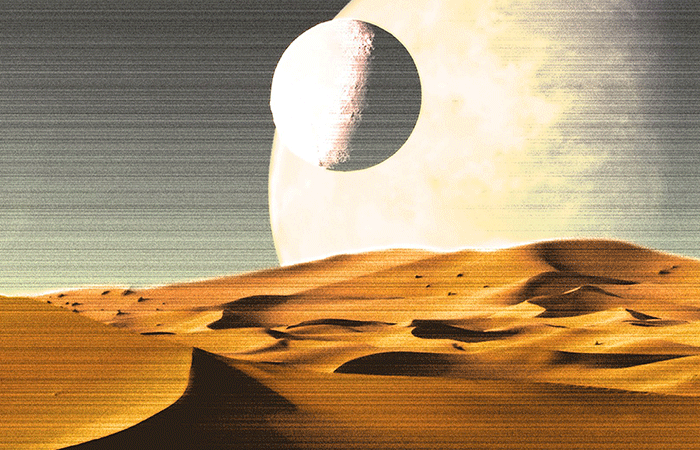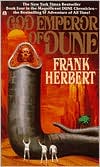Dune at 50: Common Misconceptions About Frank Herbert’s Classic
 Editor’s note: Frank Herbert’s Dune, space opera’s answer to The Lord of the Rings and possibly the most influential work of science fiction ever published, turns 50 this year. Each month throughout 2015, we’ll be examining its literary legacy and taking a look at ways it has altered the SF landscape.
Editor’s note: Frank Herbert’s Dune, space opera’s answer to The Lord of the Rings and possibly the most influential work of science fiction ever published, turns 50 this year. Each month throughout 2015, we’ll be examining its literary legacy and taking a look at ways it has altered the SF landscape.
Dune
Dune
In Stock Online
eBook $9.99
If you’ve ever had a conversation with me and I didn’t mention that Dune is my favorite book, you either didn’t talk to me long enough or were speaking to a defective clone. I’ve found excuses to discuss the series and its philosophies with fans, friends, strangers, and that kid at the library who just wanted me to leave him alone so he surf the internet in peace.
Throughout my years of “Dunevangelism,” I’ve noticed a few ideas prevalent in the minds of not-yet-fans (which is how I refer to people who haven’t read it yet). These are common misconceptions that I think prevent people from getting hooked on the series. The book is tuns 50 this year, so what better time to dispel a few myths?
Misconception #1: It’s impossible to read
Dune has a reputation as a dense and difficult work, helped not at all by the oft-repeated chestnut about the dictionary of terms that was passed out to attendees of the 1984 David Lynch adaptation. True, it’s a book that works hard to create and entire world and culture with its own language and history, but it’s built over a framework that has endured through centuries of storytelling: thrills, action, destiny and betrayal, love and conquest…your basic “epic journey” stuff.
Misconception #2: Dune is all about the spice
Your average person on the street knows two things about Dune: it’s a sci-fi book from the 60s, and it’s about that spice stuff, but that’s a bit too reductive. It’s like saying The Matrix is a movie about batteries, or The Little Mermaid is a film about a seagull who likes cutlery.
Dune isn’t about spice so much as it’s about human adaptability. Spice is incredibly useful, found in everything from coffee to the metabolisms of mutated beasts that can see through time and space (seriously, they even have a guild). It’s an important product, but it can only be found on one planet: Dune. Whoever controls Dune controls the spice, and by extension has their hand on the throat of every person in the galaxy. The monopoly has encouraged humanity to seek alternatives. Some groups work on manufacturing a synthetic replacement, but others take the path of crafting a new existence without it. Why suck down caffeine when you can just teach your brain to be more alert?
Dune, then, is about dependability, self-sustainability, and the marvels of purposeful, conscious evolution. You can draw a lot of parallels between spice and substances in the modern world: oil, electricity, drugs. But the point is, we need those things only as long as we think we do. There are internal alternatives; it’s just a matter of turning the screws and creating enough pressure to make us start working to find them.
If you’ve ever had a conversation with me and I didn’t mention that Dune is my favorite book, you either didn’t talk to me long enough or were speaking to a defective clone. I’ve found excuses to discuss the series and its philosophies with fans, friends, strangers, and that kid at the library who just wanted me to leave him alone so he surf the internet in peace.
Throughout my years of “Dunevangelism,” I’ve noticed a few ideas prevalent in the minds of not-yet-fans (which is how I refer to people who haven’t read it yet). These are common misconceptions that I think prevent people from getting hooked on the series. The book is tuns 50 this year, so what better time to dispel a few myths?
Misconception #1: It’s impossible to read
Dune has a reputation as a dense and difficult work, helped not at all by the oft-repeated chestnut about the dictionary of terms that was passed out to attendees of the 1984 David Lynch adaptation. True, it’s a book that works hard to create and entire world and culture with its own language and history, but it’s built over a framework that has endured through centuries of storytelling: thrills, action, destiny and betrayal, love and conquest…your basic “epic journey” stuff.
Misconception #2: Dune is all about the spice
Your average person on the street knows two things about Dune: it’s a sci-fi book from the 60s, and it’s about that spice stuff, but that’s a bit too reductive. It’s like saying The Matrix is a movie about batteries, or The Little Mermaid is a film about a seagull who likes cutlery.
Dune isn’t about spice so much as it’s about human adaptability. Spice is incredibly useful, found in everything from coffee to the metabolisms of mutated beasts that can see through time and space (seriously, they even have a guild). It’s an important product, but it can only be found on one planet: Dune. Whoever controls Dune controls the spice, and by extension has their hand on the throat of every person in the galaxy. The monopoly has encouraged humanity to seek alternatives. Some groups work on manufacturing a synthetic replacement, but others take the path of crafting a new existence without it. Why suck down caffeine when you can just teach your brain to be more alert?
Dune, then, is about dependability, self-sustainability, and the marvels of purposeful, conscious evolution. You can draw a lot of parallels between spice and substances in the modern world: oil, electricity, drugs. But the point is, we need those things only as long as we think we do. There are internal alternatives; it’s just a matter of turning the screws and creating enough pressure to make us start working to find them.
God Emperor of Dune
God Emperor of Dune
Paperback $9.99
Misconception #3: The later books aren’t worth reading
I’ve never spoken to anyone who has read all six of the Herbert-penned Dune novels who didn’t find value in all of them, yet even among those who respect (but have only read) the original, the sequels have a mixed reputation. It’s undeserved: The five sequels that follow it push the story of man-god Paul Atreides forward, veer off to follow his children, then jump ahead 15,000 years to bring everything full circle. The events of the first three books act as seeds for immense evolutionary triggers that mature in the second half of the series. It’s storytelling on the grandest of scale, and if you see it through to the end, it might change the way you look at our species.
Misconception #4: It stole from Star Wars
Sandcrawlers, a desert planet, moisture farming, spice mining. All of these things appear in both Star Wars and Dune. Herbert obviously stole them after seeing Star Wars, right? Nice try, kids on the internet! Dune was released in 1965 after six years of writing and research. Two more books were published before 1977, the year Star Wars came out. George Lucas was 20 years old when the first book hit, and as far as I know, he’s not a Time Lord. If he were, the copyright lawyers would go insane.
Misconception #5: Frank Herbert was homophobic and doesn’t deserve an audience
This is the weirdest claim I’ve seen about the book and its author. The point of evidence is that the main villain, Baron Vladimir Harkonnen, shows a proclivity for sleeping with men—on four occasions he makes references to wanting something young and pretty and male to be brought to his chambers. He’s a repulsive bad guy, so everything he does is, by simple extension, thought of as repulsive by the author and should be seen in the same light by the readers. Right? Like everything else in Dune, taking these events at face value does a disservice. The key word in the Baron’s speech is “young.” He’s not interested in men as much as he is children (in one instance, his own young relative). The Baron is an incestuous pedophile who craves control. He can’t defeat Paul or the Fremen, he can’t secure Dune, so he satisfies his power lust by dominating the young.
Why do you think Dune has endured as a classic of the genre?
Misconception #3: The later books aren’t worth reading
I’ve never spoken to anyone who has read all six of the Herbert-penned Dune novels who didn’t find value in all of them, yet even among those who respect (but have only read) the original, the sequels have a mixed reputation. It’s undeserved: The five sequels that follow it push the story of man-god Paul Atreides forward, veer off to follow his children, then jump ahead 15,000 years to bring everything full circle. The events of the first three books act as seeds for immense evolutionary triggers that mature in the second half of the series. It’s storytelling on the grandest of scale, and if you see it through to the end, it might change the way you look at our species.
Misconception #4: It stole from Star Wars
Sandcrawlers, a desert planet, moisture farming, spice mining. All of these things appear in both Star Wars and Dune. Herbert obviously stole them after seeing Star Wars, right? Nice try, kids on the internet! Dune was released in 1965 after six years of writing and research. Two more books were published before 1977, the year Star Wars came out. George Lucas was 20 years old when the first book hit, and as far as I know, he’s not a Time Lord. If he were, the copyright lawyers would go insane.
Misconception #5: Frank Herbert was homophobic and doesn’t deserve an audience
This is the weirdest claim I’ve seen about the book and its author. The point of evidence is that the main villain, Baron Vladimir Harkonnen, shows a proclivity for sleeping with men—on four occasions he makes references to wanting something young and pretty and male to be brought to his chambers. He’s a repulsive bad guy, so everything he does is, by simple extension, thought of as repulsive by the author and should be seen in the same light by the readers. Right? Like everything else in Dune, taking these events at face value does a disservice. The key word in the Baron’s speech is “young.” He’s not interested in men as much as he is children (in one instance, his own young relative). The Baron is an incestuous pedophile who craves control. He can’t defeat Paul or the Fremen, he can’t secure Dune, so he satisfies his power lust by dominating the young.
Why do you think Dune has endured as a classic of the genre?

